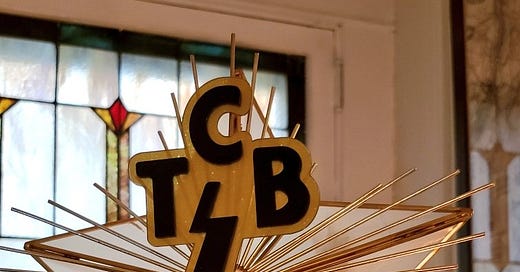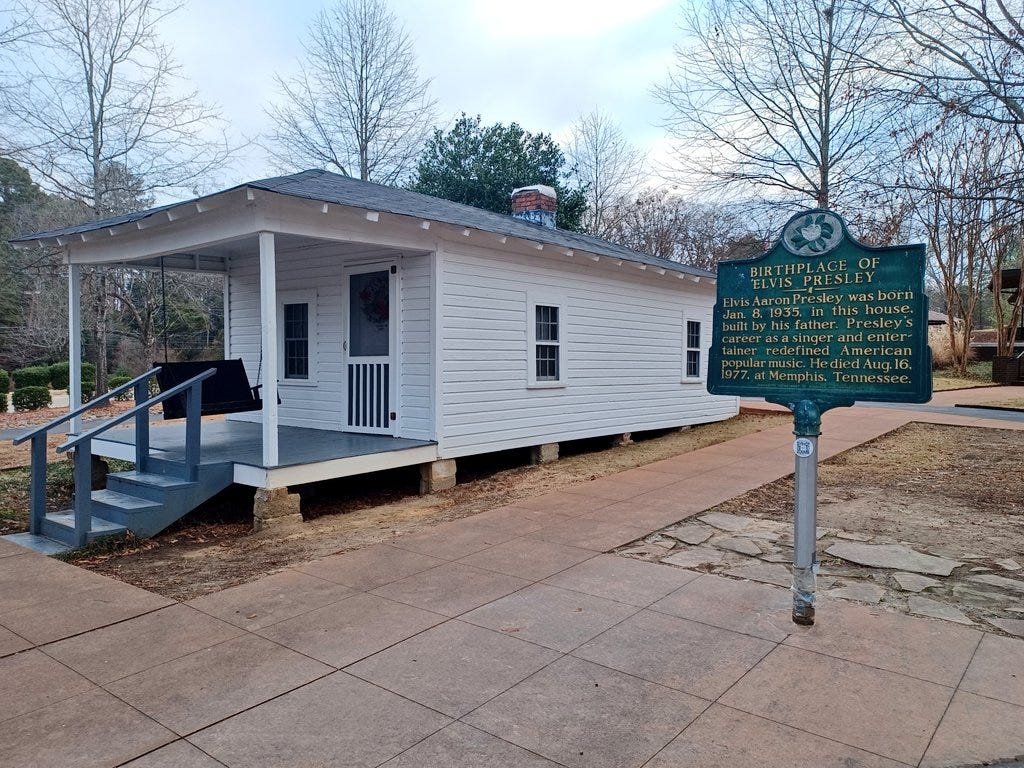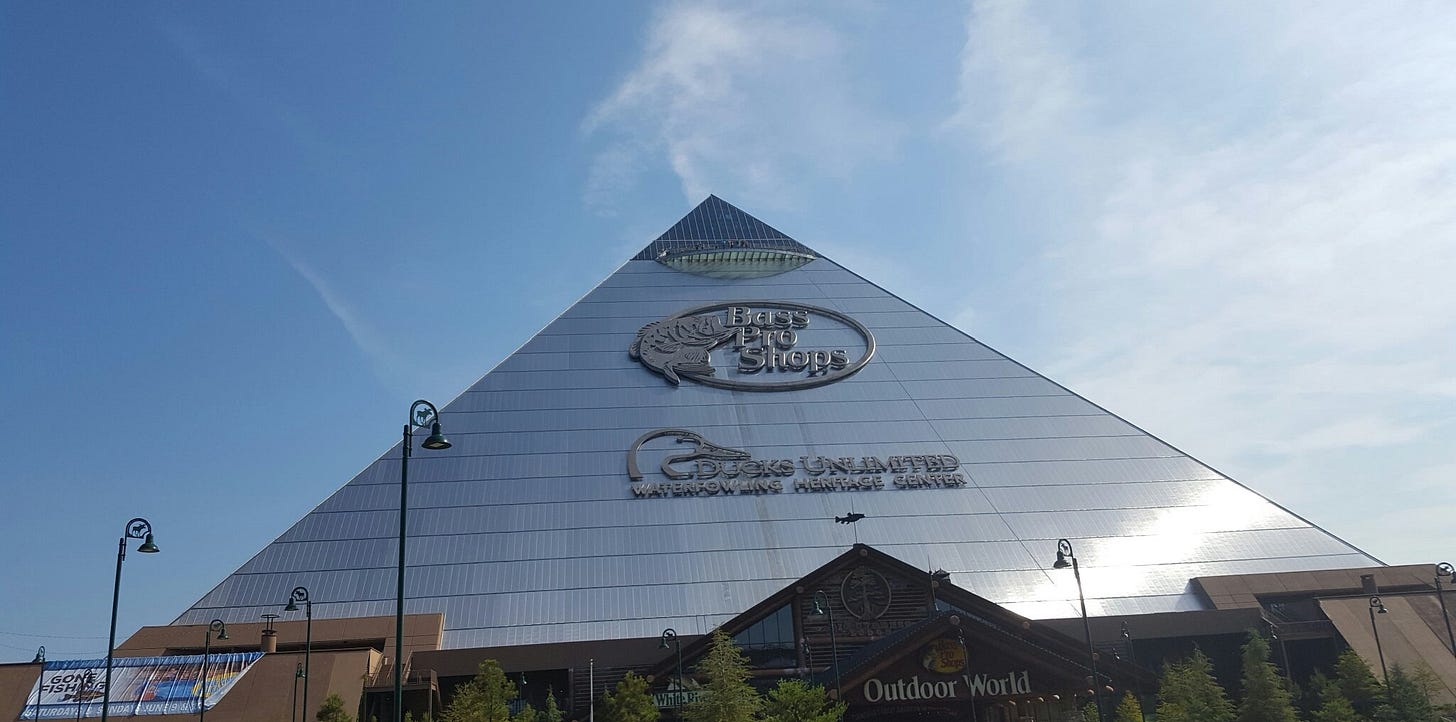My parents saw Elvis Presley live in 1976, one year before he died, and somehow didn’t tell me until last week. They had near front-row seats and my mom could see Elvis up close, stuffed into a white suit, gasping his way through the hits. He was sick and sweaty and slurring, suffering on the stage.
It was clear he wasn’t well. But they never thought that in a year he’d be gone. He was Elvis and they were Boomers. Elvis had always been there, and it seemed he always would be, even as he deteriorated. Whether you loved him or loved to mock him, Elvis was the star around which American pop culture orbited.
You never thought he’d just die on the toilet.
This is what it feels like to watch America in 2024. A fading star, a bittersweet song, every day feeling like a farewell tour. You are the audience but you are also Elvis: tired of performing for the benefit of people who hurt you, trying to remind yourself that the music still matters. The government is Colonel Parker, Elvis’s vicious manager, exploiting every fear.
You are never safe in America, even when you’ve made it — even when you are an “it” upon whom things are made. That’s the worst part, Elvis knew: to become a brand and lose being a person.
In his day, that was the model for pop stars. In the digital era, it is the model for everyone.
I asked my mom about Elvis because I’ve watched Return of the King, the documentary about Elvis’s 1968 comeback concert, a dozen times since its November debut. This was accidental: I was so exhausted that I kept falling asleep, forcing a nightly replay. I’d drift off to Elvis’s gospel howl and awaken to musicians analyzing the industry predators who sought to steal his soul.
Money was only the quotient indicating the degree to which he’d be abandoned, one said —
— and I thought about the insurance CEO whose policies killed tens of thousands before a masked man shot him dead and the president who helped kill tens of thousands overseas and then pardoned his son who was made wealthy through ill-gotten gains and how we were supposed to excuse their behavior because the incoming president is even worse, a rerun kleptocrat whose own pardons are a rogue’s gallery of the worst Americans, some of whom he seeks to grant federal power along with the crypto sons of apartheid —
And then Return of the King would return to my screen, because this madness has a temporary cure. If you want to drown out the nightmare, you can — because there is still American music, the most reliable outlet for American pain. The well so deep it restores even the dead light in an icon’s eyes.
I don’t want my country to collapse. I want it to be redeemed, like Elvis in his 1968 comeback special. When he was truly himself, in all his contradictory appeal, the best and truest Elvis he could be.
When he didn’t know how little time was left and could find redemption outside of applause.
* * *
In 2017, my sister and I took our children to Graceland. Four kids under ten years old, mystified by the shrine to a pompadoured rando with shag carpeting.
“What’s ‘TCB’?” my nephew asked as we passed Elvis’s private jet.
“Taking Care of Business!” I exclaimed, not sure how to impart the irony of Elvis’s inability to do so. “The lightning bolt means he’s Taking Care of Business in a Flash.” My nephew side-eyed me, thinking this could not be real. That is a standard reaction to Graceland.
Inside we passed women weeping near stained-glass peacock doors and portraits of Elvis cased in gold. I’ve been to Graceland three times, and it’s always packed with crying pilgrims.
But Graceland is no weirder than anything else in Memphis: the hamburger joint that has been recycling the same grease for a century and had it transported in an armored vehicle when it switched locations; the Bass Pro Shop shaped like a giant silver pyramid with a live alligator pit inside; the ducks in the Peabody Hotel who perform a daily red carpet parade led by a formally dressed “duck master” before returning to their Royal Duck Palace on the roof; the vendors outside the Lorraine Hotel who, in an act of atrocious tastelessness, sold Martin Luther King shot glasses.
Memphis — so wounded, so wonderful, so wrong and so right, like its most famous resident.
The kids asked whether Elvis was popular when we were little. Yes, we told them, in the 1990s, Elvis was everywhere. Elvis had died before we were born — but had he, really? Or was he in hiding, spotted across the nation like Bigfoot? The rumor was an admission that Elvis had too much America inside him and had to quit before it poisoned him with the downers and PBB&Bs. (The third B stands for Bacon.)
You couldn’t go to the supermarket without a checkout tabloid proclaiming ELVIS LIVES. You didn’t kill him, they assured us, he’s safe, a safe honeychild of America, thankyouverymuch. The Elvis memorabilia industry exploded. The generation that loved him most had disposable income and they stayed loyal to their King.
Younger generations were more skeptical. In 1989, Public Enemy declared, “Elvis was a hero to most/But he never meant shit to me,” condemning the racist industry that elevated Elvis while leaving the Black musicians who inspired him behind. Gen X learned American history from that song but forgot it decades later — or maybe they didn’t want to fight the power in the first place.
But we all rode the wave of inanity. The first person I voted for in a national election was Elvis. In 1992, the United States held a referendum: which Elvis should be on a stamp, Fat Elvis or Skinny Elvis? Ballots were available at your local post office or People magazine. Bill Clinton made an endorsement. Skinny Elvis swept the polls, garnering nearly a million votes, and became the most popular stamp of all time. I voted for Fat Elvis because he seemed lonesome, and I knew Elvis did not like being lonesome tonight.
When I told this tale to my children, I had to fact check it because it seems surreal: the casual comradery, the functional postal service, the existential crises lurking like cicadas underground.
I wish my children could have voted in the Elvis Election, to see what it’s like to cast a ballot without fearing a coup.
At Graceland, I bought a “TCB” Christmas tree topper. It is decorated with a lightning bolt, back when that emblem didn’t instantly evoke Nazi stormtroopers. Back when the return of fascism was a shock instead of an American expectation.
* * *
I have a playlist I listen to when I’m thinking about the government. It has only one song.
The song has different titles — Bobbie Gentry called it “Sermon,” Johnny Cash called it “God’s Gonna Cut You Down,” Bill Lanford called it “Run On for a Long Time,” and Elvis called it “Run On” — because it belongs to none of them and to all of us. This song is American gospel: a threat and a promise, with each variation tallying different sins.
The song’s characters include the long-time liar, the midnight rider, the gambler, the rambler, and the backbiter. It’s like a session of Congress, only with a promise that in the end people get what they deserve.
My heart is with Bobbie Gentry’s acoustic demo — there’s just something about female writers slighted for being ahead of their time — but I love the Elvis version. He’s but a pious messenger, the song insists, yet his warning makes you move like a fire lit under your feet. In Return of the King, friends note how gospel saved Elvis’ career and life, allowing him to shed his plastic 1960s skin and bear his soul.
The vast quantity of low-grade Elvis is part of the Elvis charm. But it’s the sincerity that makes you stay. Elvis had heart. It’s what people struggle to find behind AI and algorithms. It’s what’s missing from the sold-out souls of Americans turned into digital brands. Americans used to consume celebrities, now we consume each other.
My favorite Elvis song is “Edge of Reality.” It was released in 1968, a year when mainstream singers were making extremely strange shit on the velvet mornings when they were straight. Elvis croons of madness:
Oh, I can hear strange voices echo
Laughing with mockery
The borderline of doom I'm facing
The edge of reality!
Elvis lives — in 2024 America, in the here and now, where the edge is the center, and the center does not hold.
I’ve heard that the tech overlords want to turn Elvis into an eternally touring hologram. When it happens, then I’ll know Elvis is really dead.
And who killed him.
* * *
In December 2023, I drove the Natchez Trace Parkway up Mississippi to Tupelo and ate something called a “Belvis Burger” at a restaurant called The Neon Pig.
Tupelo is one of those small cities with an economy based on a hometown hero long gone. I’m familiar with the type: Hannibal, Missouri, home of Mark Twain, is another.
We stayed in a chain hotel decorated with Elvis everything. Outside was a sideways billboard stand looming like a crucifix near the highway. I named it “The Black Cross of Tupelo” and pretended it was a local landmark. The power lines surrounding it reminded me of the lightning bolt from “Taking Care of Business in a Flash.”
Here is where Elvis derived his powers, I thought. Electric American Jesus!
2023 had been a long, hard year, and I wasn’t sleeping much then either.
We went to Elvis’s childhood home, a shotgun shack with a church nearby. A memorial plaque for Elvis’s stillborn twin, Jessie, is there. He died a half hour before Elvis entered the world.
There is an unnerving starkness to the Tupelo home and especially to that sad twist of fate. This was the place of poverty Elvis was terrified of revisiting. This was the edge of reality, and he did not want to cross it, and you couldn’t blame him.
Return of the King is the story of how scared Elvis was. Scared he would let down his fans, let down the country, let down himself. Scared he would pull himself down into depths of no return, which he did, in the end.
But for one glorious night, he destroyed everyone’s expectations, including his own.
I am haunted by the documentary’s look at money and abandonment. How money is not only a means of survival, but a token mistaken for love. How the digital era encourages people to quantify every like and follow and let data subsume the soul.
How an unexpected large bill is a real expression of hate: the swift plunge into deprivation, the cold slap of corporate cruelty. There is no reason necessities like healthcare should bankrupt anyone: it is sadism posing as bureaucracy. This is why Americans do not mourn a slain insurance CEO but instead mourn the families his company robbed of life and dignity.
Americans live in fear: even the ones at the top, even Elvis. At the heart of the fear is the threat of humiliation, which can be converted into rage — sometimes destructive, sometimes righteous. American music was invented by the downtrodden: people battered but not beaten down enough to forgive the parties responsible for their plight. They documented it in song instead. Gospel, bluegrass, country, blues, rap: all American genres reckon with redemption and revenge.
American music came from folks wondering why all this heartache landed on them in the first place. Why a country you love acts like it hates you — and these days, what worse entity may replace it if implodes.
For now, the mess is still recognizably ours. Not yet overrun by artificial intelligence, not yet fiefdoms partitioned and sold for parts, but a particularly American kind of damage and delusion. The kind that gazes at you with youthful doe eyes from a stamp, because America likes to pretend that is what it still looks like, instead of a bloated addict dying on the toilet.
“If you're looking for trouble, then look right in my face,” Elvis sang in his comeback special, eyes gleaming. “Because I'm evil: my middle name is Misery.”
And then he wailed for redemption, like an American.
* * *
Thank you for reading! I would never paywall in times of peril. But if you’d like to keep this newsletter going, please consider becoming a paid subscriber. That ensures every article remains open to everyone. I appreciate your support!
The birthplace of Elvis Presley, Tupelo, Mississippi.
Taking care of Christmas business!
The subtle interior decor of Graceland.
Oh Elvis, why?
Are you lonesome tonight?
The Bass Pro Shop of Memphis, Tennessee.
Afternoon duck parade at the Peabody Hotel in Memphis. There were roughly one hundred people there to watch ducks walk down a red carpet.












I'm grateful for all the heartfelt comments and memories this article inspired folks to share in the posts below. If I haven't responded to you, it's just because I'm worn out, not because I'm not interested. I'm glad I can leave my articles and comments section open to all so that such an interesting group of people can share their thoughts and recollections. Everyone has been cool and respectful, which is a remarkable thing in this day and age. Means a lot. Thank you, or shall I say Elvis-style -- "Thankyouverymuch"!
Gosh. This is brilliant and remarkable, ma'am. And I'm more spent/awake/sobered than I thought - I ought to have - I can sense, a pouring of quiet tears from the well of grief you've opened here; but,
I can see that Money is going to run all the tables; Money is having its day, Money is going to more and more strive to possess our being, and there's pretty much nothing I can do about it; Except,
to stop participating in the worship of it. I have firewood to split. There'll be warmth twice from that. Winter is here.